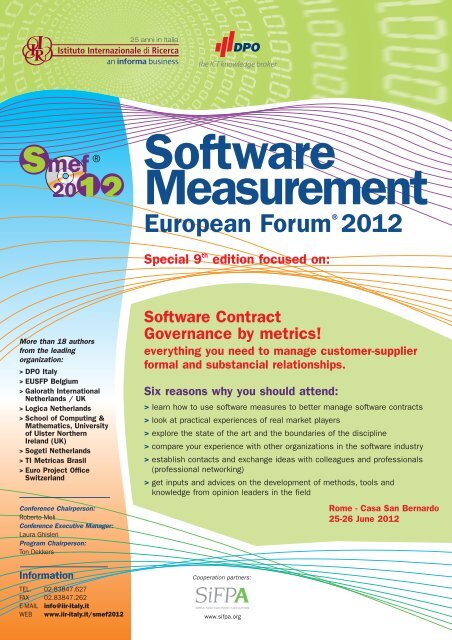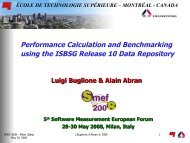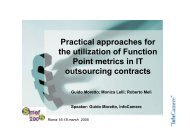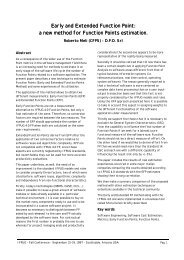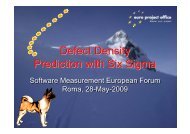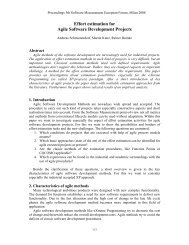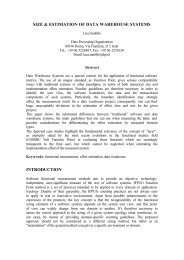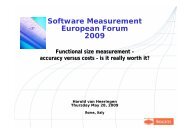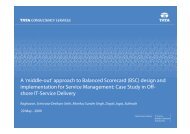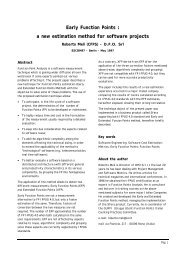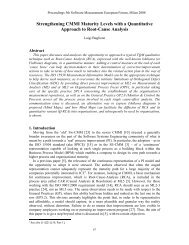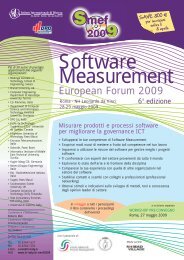Software Measurement - DPO
Software Measurement - DPO
Software Measurement - DPO
Create successful ePaper yourself
Turn your PDF publications into a flip-book with our unique Google optimized e-Paper software.
<strong>Software</strong><br />
<strong>Measurement</strong><br />
European Forum ® 2012<br />
Special 9 th edition focused on:<br />
More than 18 authors<br />
from the leading<br />
organization:<br />
> <strong>DPO</strong> Italy<br />
> EUSFP Belgium<br />
> Galorath International<br />
Netherlands / UK<br />
> Logica Netherlands<br />
> School of Computing &<br />
Mathematics, University<br />
of Ulster Northern<br />
Ireland (UK)<br />
> Sogeti Netherlands<br />
> TI Metricas Brasil<br />
> Euro Project Office<br />
Switzerland<br />
Conference Chairperson:<br />
Roberto Meli<br />
Conference Executive Manager:<br />
Laura Ghisleri<br />
Program Chairperson:<br />
Ton Dekkers<br />
<strong>Software</strong> Contract<br />
Governance by metrics!<br />
everything you need to manage customer-supplier<br />
formal and substancial relationships.<br />
Six reasons why you should attend:<br />
> learn how to use software measures to better manage software contracts<br />
> look at practical experiences of real market players<br />
> explore the state of the art and the boundaries of the discipline<br />
> compare your experience with other organizations in the software industry<br />
> establish contacts and exchange ideas with colleagues and professionals<br />
(professional networking)<br />
> get inputs and advices on the development of methods, tools and<br />
knowledge from opinion leaders in the field<br />
Rome - Casa San Bernardo<br />
25-26 June 2012<br />
Information<br />
TEL. 02.83847.627<br />
FAX 02.83847.262<br />
E-MAIL info@iir-italy.it<br />
WEB www.iir-italy.it/smef2012<br />
Cooperation partners:<br />
www.sifpa.org
SMEF ® 2012<br />
25-26 June 2012 PROGRAM<br />
Why should you attend?<br />
Istituto Internazionale di Ricerca, part<br />
of Informa Plc, and <strong>DPO</strong> (Data<br />
Processing Organisation), leader<br />
company in software measurement,<br />
in cooperation with Simple Function<br />
Point Association (SiFPA), are<br />
delighted to announce the 9th<br />
<strong>Software</strong> <strong>Measurement</strong> European<br />
Forum. The 2012 event offers a<br />
program designed to illustrate the<br />
best practices, recommendations,<br />
tools, techniques and implementation<br />
processes of software measurement<br />
in order to optimize the processes of<br />
planning, negotiation, execution and<br />
control of software contracts.<br />
Using software metrics in contracts is<br />
not only a subject for technicians: all<br />
the parts that are involved in the<br />
procurement process should be<br />
aware of the opportunity and risks of<br />
using it and on the more effective<br />
ways of adoption. This year’s event<br />
will focus on this area resulting as an<br />
in depth analysis of methods,<br />
models, experiences.<br />
Program<br />
<strong>Software</strong> Contract Management<br />
by metrics: a methodological<br />
framework<br />
Roberto Meli (<strong>DPO</strong> Italy)<br />
This presentation will introduce a conceptual<br />
and operational framework for the application<br />
of the software measurement discipline<br />
within the context of a contractual relationship<br />
between customer and supplier. Any<br />
given contractual agreement regarding software<br />
acquisition requires a specific implementation<br />
of a measurement model. A<br />
Contractual <strong>Measurement</strong> Model is a set of<br />
answers to the following questions:<br />
• Why to measure? (business goals)<br />
• What to measure? (nature of an ad-hoc<br />
software supply, scope of work, on going<br />
change request, cancelled activities,<br />
reuse and replication)<br />
• How to measure? (contractual scheme,<br />
measurement method, process and<br />
tools)<br />
• When to measure? (during the contract<br />
life cycle)<br />
• Who will measure? (role and<br />
responsibilities)<br />
Parametrics in contracts is also<br />
beneficial for suppliers<br />
Ton Dekkers (Galorath International<br />
Netherlands / UK)<br />
In a tender the supplier has to commit to<br />
the rules defined by the customer. In this<br />
case the customer wanted a all-inclusive<br />
price per function point for a given project<br />
size. The supplier’s experience with this<br />
type of tender was very limited. This case<br />
describes the approach and the challenges<br />
to get in the end to a successful project<br />
tender.<br />
• Validating project size with (NESMA)<br />
Function Point Analysis<br />
• Validation and Verification performance<br />
based on ISBSG data and SEER for<br />
<strong>Software</strong><br />
• Convince supplier management on a<br />
competitive bid based on parametric<br />
models<br />
When Metrics Mean Business<br />
Maurizio Aguiar (TI Metricas Brasil)<br />
<strong>Measurement</strong> specialists often wonder why<br />
so many Brazilian organizations use functional<br />
size as a basis for software development<br />
contracts. Brazilian organizations<br />
from several industries such as banks, airlines,<br />
telecommunication companies, and<br />
government agencies use function points<br />
as a basis for software development contracts.<br />
The Brazilian government has<br />
issued a directive known as “IN04” instructing<br />
all government agencies to use<br />
metrics - usually function points - in software<br />
development contracts to define productivities,<br />
prices, and quality criteria. In<br />
those organizations most software development<br />
services are billed based on the<br />
functional size. Even support activities<br />
such as measurement and testing have<br />
been known to be billed based on function<br />
points. Function point analysis is now an<br />
indispensable part of the business cycle<br />
and a daily activity in many organizations.<br />
This presentation discusses the business<br />
drivers that have made Brazil the number<br />
one user of function points in the world, as<br />
well as the business processes involved.<br />
• Why and how Brazilian organizations use<br />
functional sizing in software<br />
development contracts<br />
• How the functional size supports<br />
contract objectives for both the acquirer<br />
and supplier<br />
• Technical considerations related to the<br />
use of function points in contracts<br />
• Benefits and challenges to be aware of<br />
when using function points in contracts<br />
Beyond perception: Peeking over<br />
the wall to get real control...<br />
Eric van der Vliet, Paul Siemons<br />
Eric van der Vliet (Logica Netherlands)<br />
Management in an organisation have the<br />
role to control their environment with the<br />
intention to achieve their objectives.<br />
Objectives for managers are derived from<br />
organisation level objectives and often defined<br />
by means of KPI’s. The focus of KPI’s<br />
is mainly on financial, productivity, quality<br />
or elapsed time aspects. By all means will<br />
these aspects influence the contracts, therefore<br />
it’s relevant whether the information<br />
the decisions are based on is perception or<br />
reality. To reduce the gap between perception<br />
and reality the IMD-Model has been<br />
defined.<br />
The IMD-Model offers:<br />
• Validating information: perception or<br />
reality<br />
• Support of management decisions: to<br />
tender or not to tender<br />
• Model based control on information<br />
provided by a measurement system<br />
Through the Looking Glass:<br />
What does a Tender Document<br />
actually tell you?<br />
P. Morrow, F.G. Wilkie, I.R. McChesney,<br />
C. Tuxworth<br />
George Wilkie (School of Computing &<br />
Mathematics, University of Ulster<br />
Northern Ireland - UK)<br />
For fixed-price contracts, the most important<br />
decision to make in a software development<br />
project is whether or not to proceed<br />
in the first place. Consequently, in a<br />
project tender situation the tender (or bid)<br />
estimate is crucial in informing this decision.<br />
The goal of this study is to determine<br />
what can be discerned from what the bid<br />
document does tell you, in order to identify<br />
what it does not tell you<br />
• Q1 - Can a detailed assessment of the<br />
profile of required functionality at two<br />
distinct stages in the project lifecycle<br />
provide a validation of the adequacy of<br />
requirements documentation at the bid<br />
stage of a project.<br />
• Q2 - Do overall indicators of potential<br />
future growth exist in bid<br />
documentation?<br />
• The (Functional) Size Metric used is<br />
(NESMA) Function Points<br />
Successful software projects -<br />
how to limit the risk of failures!<br />
Harold van Heeringen (Sogeti<br />
Netherlands)<br />
This paper focuses on selecting a single<br />
supplier for the development of a custommade<br />
software realisation project, while<br />
keeping in mind that the project should be<br />
successful! Half of the project success is<br />
already determined before the start of the<br />
project, agreeing on the right contract in the<br />
sourcing phase.<br />
Following items will be addressed:<br />
• The questions you should ask the<br />
supplier to answer in their proposal<br />
• Why it is important to select a realistic<br />
proposal, not just the cheapest one<br />
• How to assess the reality value of the<br />
proposals of the different suppliers<br />
Which KPI’s should be defined to make the<br />
contract work<br />
How to state a fair unitary cost for<br />
FP in a tender context<br />
Roberto Meli (<strong>DPO</strong> Italy)<br />
There are two main paths to state the base<br />
www.iir-italy.it/smef2012 SPECIALI QUOTE PER ISCRIZIONI – info@iir-italy.it MULTIPLE: – DETTAGLI Ph. 02.83847.627 NELLA SCHEDA – Fax D’ISCRIZIONE<br />
02.83847.262
unitary cost per FP in a Request for Proposal<br />
or a Public Tender. The first one is to rely on<br />
previous similar assigned contracts and<br />
their unitary prices adopting averages or<br />
min-max values (market approach). The<br />
second one is to build a specific unitary<br />
price considering expected average productivity,<br />
adjustment factors, resources mix, unitary<br />
human resource costs, life cycle phases<br />
and distribution of effort and roles (constructive<br />
approach). The same approaches<br />
may be used by the supplier in the offering<br />
phase. The second approach is generally<br />
more adequate since it allows to purify the<br />
process from the usual distortions due to<br />
the “offer to win” approach associated to<br />
the expectation of absence of control in contract<br />
execution. This presentation will discuss<br />
these aspects giving a detailed proposal<br />
for the constructive approach but also an<br />
overview of the market approach with unitary<br />
prices in different countries.<br />
• Unitary price construction<br />
• Avoid “offer to win” distortions<br />
• Keep contract in control after assigning it<br />
The meaning of software<br />
measurement in a contractual<br />
relationship<br />
Marco Gentili (Italy)<br />
Pierfranco Gennai (<strong>DPO</strong> Italy)<br />
Functional <strong>Measurement</strong> was developed<br />
aseptically in the research field of Sw<br />
Engineering. When it is used in a contractual<br />
context, in order to manage the<br />
customer/supplier relationship, it is associated<br />
with a number of degenerative nonacademic<br />
interpretations that can produce<br />
real diseases, both during the procurement<br />
process of software development services,<br />
and in the execution phase of the corresponding<br />
contracts. For this reason DigitPA<br />
(formerly CNIPA) decided to treat the functional<br />
measure issue in its “Guidelines on<br />
the quality of ICT assets and services for the<br />
establishment and governance of ICT contracts<br />
in Public Administration”, without forgetting<br />
the need for non-functional measurements<br />
too.<br />
• The easy way to escape: I am not able to<br />
make a “turn key” tender, I do not make<br />
Feasibility Study, I do purchase “by<br />
metrics”, will I be able to use the<br />
balance?<br />
• The mith of FP unitary cost: FP is not a<br />
currency.<br />
• Pseudo estimation: backfiring from costs<br />
• Why considering only <strong>Software</strong><br />
Functionalities?<br />
• A missing opportunity (until now):<br />
measuring to manage, knowing to<br />
control, where is the Public<br />
Administration Projects Repository?<br />
A practical approach to validate<br />
actual functional size measures in<br />
a contract<br />
Marco Arzilli, Franco Perna (<strong>DPO</strong> Italy)<br />
The customer verification of functional size<br />
measures provided by the supplier in the<br />
acceptance phase is a critical activity for the<br />
correctness of contract execution. A lack of<br />
control, both in depth and in scope, can lead<br />
to relevant deviations of the unitary price<br />
accepted in the bid assignment process,<br />
with potential consequences in terms of<br />
unfairness or, in some cases, illegality. In<br />
the presentation we’ll show an efficient and<br />
rigorous approach to validate supplier’s<br />
functional size measures. The approach is<br />
rigorous, since it defines clear and unambiguous<br />
game roles and efficient, in order to<br />
spend the right effort to achieve the right<br />
confidence about suppliers functional size<br />
measurement capabilities. The approach<br />
consists in an incremental sampling technique,<br />
that allows the customer to adjust the<br />
validation effort on the quality level of size<br />
measures provided by the supplier, detected<br />
by the gap among these measures and the<br />
ones checked and validated on a sampling<br />
base. The approach provides also a simple<br />
classification of main causes for this measure’s<br />
deviation, useful to improve both the<br />
measurement and the validation process.<br />
• How to satisfy compliance with<br />
contractual prices<br />
• Validating supplier functional size<br />
measures: why, when and how<br />
• Adopting an efficient validation process is<br />
possible: a practical guide to do this<br />
<strong>Software</strong> Comprehensive Count<br />
with Quality Indicators (SCCQI)<br />
Jasveer Singh (EUSFP Belgium)<br />
As software size measurement is one of the<br />
most important activities in the software<br />
development lifecycle, the methodology<br />
used for estimating the size should be able<br />
to measure the size comprehensively. That<br />
means that all the software constituents<br />
should be considered for measuring the size<br />
and a proper translation of the measured<br />
size to the effort estimate should be possible.<br />
<strong>Software</strong> Comprehensive Count with<br />
Quality Indicators (SCCQI) is a methodology<br />
that offers an elaborate and comprehensive<br />
measurement of size, a more realistic effort<br />
estimate (as a result of using 26 extensive<br />
measures of counting) and important and<br />
valuable Key <strong>Software</strong> Indicators (KSI’s).<br />
AGENDA<br />
The realistic estimate and the KSI’s are very<br />
useful in:<br />
• the bid process (supplier)<br />
• the validation process (customer)<br />
• defining controllable delivery criteria in<br />
contracts<br />
Key Performance Indicators for<br />
ICT Services<br />
Thomas Fehlmann (Euro Project Office<br />
AG, Zurich, Switzerland)<br />
Services related to Information and<br />
Communication Technology (ICT) play a<br />
major role for an organisation's commercial<br />
success and are highly predictive for its prestige<br />
with employees, customers and in<br />
public opinion, and thus for future business.<br />
Despite their strategic importance, ICT services<br />
are often outsourced and contracted<br />
to service providers.Organisations need<br />
early indicators for trends affecting ICT services,<br />
since loss of employees and of customers<br />
invariably ends with loss of market<br />
share and profit. Such indicators can be<br />
used to determine on variable compensation<br />
and incentives for quality service.Functional<br />
size and defect density play a major role;<br />
however, the worst kind of defects in ICT services<br />
is missing market expectations or not<br />
understanding new market requirements<br />
when doing business over the internet and<br />
supported by ICT. How should such defects<br />
be handled in contracts? This paper gives an<br />
overview about state of the art in social<br />
media times and proposes a comprehensive<br />
set of Key Performance Indicators that<br />
should help organisations contracting reliable<br />
ICT services.<br />
The program is under<br />
continuous development.<br />
Consult our website for<br />
updated schedule.<br />
Monday, 25 June 2012<br />
9.00 Registration and hand out off conference proceedings<br />
13.00-14.00 Networking lunch<br />
18.00 Conference conclusion<br />
Tuesday, 26 June 2012<br />
9.00 Reopening<br />
13.00 Conference conclusion<br />
www.iir-italy.it/smef2011 THE CONFERENCE – info@iir-italy.it WILL – BE Tel. HELD 02.83847.627 IN ENGLISH– Fax 02.83847.262
<strong>Software</strong><br />
<strong>Measurement</strong><br />
European<br />
Forum 2012<br />
registration<br />
form<br />
FORUM 25-26 June 2012<br />
> Registration fee<br />
❏ € 390 FORUM<br />
For registration before 25 May, 20% DISCOUNT<br />
P4219<br />
+21%VAT (VAT exempt for foreing companies)<br />
Conference fee includes lunch, refreshments, documentation.<br />
IMPORTANTE!<br />
Inserire il priority code<br />
indicato nell’e-mail ricevuta<br />
Priority Code ____________<br />
> Venue: Rome - Casa San Bernardo<br />
Via Lauraentina, 289 - 00192 Rome<br />
Ph. +39 065.407651 - www.casasanbernardo.it<br />
In the conference venue there is a limited allocation of<br />
rooms available. Please arrange the room reservation<br />
directly with the hotel.<br />
> Personal details:<br />
P4219-P196/IX<br />
> Cancellation<br />
Regrettably no refunds can be made for cancellations received<br />
after 18 June. Substitutions of enrolled delegates may be made<br />
up to 24 hours prior to the conference. If, for any reason, IIR<br />
decides to cancel this event, we are not responsible for covering<br />
airfare, hotel or either costs incurred by the registrants. Program<br />
content is subject to change withouth notice.<br />
> Payment details<br />
Payment must be received prior to the conference in order to<br />
guarantee your place. All registrations are acknowledged by<br />
return - receipted invoice.<br />
Deposit on postal giro account n.16834202<br />
Bank Cheque<br />
Bank Transfer: Banca Popolare di Sondrio, Agenzia 10<br />
Milano, C/C 000002805x07, ABI 05696, CAB 01609,<br />
CIN Z; IBAN IT29 Z056 9601 6090 0000 2805 X07;<br />
Swift POS OIT22, in the name of Istituto Internazionale di<br />
Ricerca Srl. Please insert delegate name and conference Code<br />
T3737 in the transmission details<br />
Credit Card: ❍ Eurocard/Mastercard<br />
❍ Visa<br />
N°<br />
CVV*<br />
Owner<br />
Exp. Date<br />
❍ CartaSì<br />
NAME<br />
SURNAME<br />
JOB TITLE<br />
ADDRESS<br />
POST CODE COUNTRY CITY<br />
PH.<br />
FAX<br />
HEAD OF DEPARTMENT<br />
JOB TITLE<br />
> Company details:<br />
COMPANY<br />
TYPE OF BUSINESS/INDUSTRY<br />
VAT NUMBER<br />
ADDRESS<br />
POST CODE COUNTRY CITY<br />
PH.<br />
FAX<br />
E-MAIL<br />
REGISTER NOW<br />
PH. +39 02.83847.627<br />
FAX +39 02.83847.262<br />
E-MAIL iscrizioni@iir-italy.it<br />
WEB www.iir-italy.it/smef2012<br />
POSTA Istituto Internazionale di Ricerca<br />
Via Forcella, 3 - 20144 Milano (Italy)<br />
SAFEGUARDING PERSONAL DATA - INFORMATION<br />
As per Law n. 196/03 we inform the Participant that: (1) the personal data entered in the registration card ("Data") will be computer<br />
processed by the Istituto Internazionale di Ricerca (I.I.R.) to fulfill all obligations pertaining to his/her conference participation, for statistical<br />
purposes, and to send out I.I.R. promotional material; (2) entering said data is optional, but without it these services cannot<br />
be effected; (3) with your consent, the data will be communicated to companies controlled by (or otherwise connected, even indirectly,<br />
to) I.I.R., i.e., to third parties in Italy and abroad for market research and to promote the services they offer; in other words, for<br />
the purposes given in point 1. The Participant has the right to object to having his/her data communicated.<br />
The director of data-handling is the Istituto Internazionale di Ricerca, Via Forcella 3, Milan, upon which the Participant may exercise<br />
the rights set down in Law 196/03 (i.e., data access, correction, cancellation, opposition, notification of handling purposes)<br />
contacting us by:<br />
More information and details on our website: www.iir-italy.it<br />
e-mail variazioni@iir-italy.it – fax +39 02.83.95.118 – phone +39 02.83.847.634<br />
Timbre & Signature<br />
Stampa n. 20<br />
sabrinatrezzi.com graphic designer<br />
sabrina trezzi graphic designer<br />
Signature<br />
*On the back of your credit/debit card (Visa, Mastercard & Others) you<br />
will see some numbers printed within the strip where you signed your<br />
card. These are known as 'signature digits', sometimes referred to by<br />
the credit card industry as 'CVV2'. We require the last three for Visa,<br />
Mastercard & Others .


